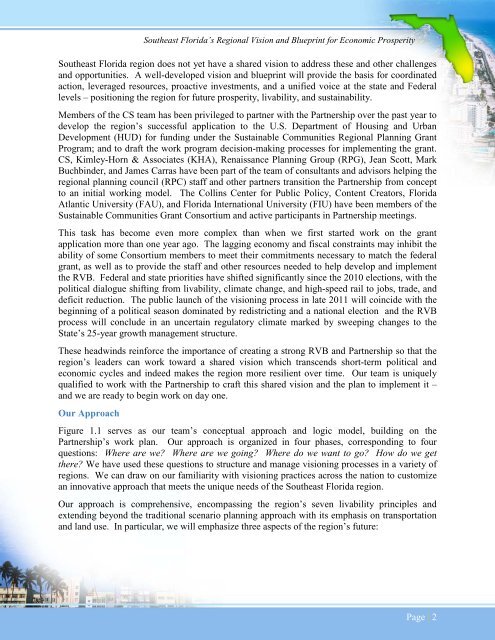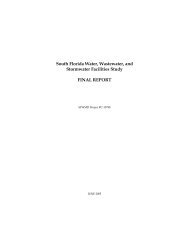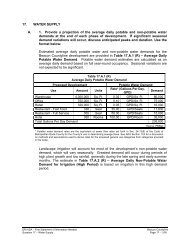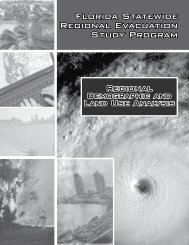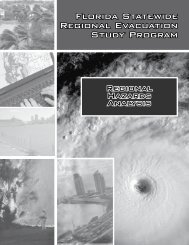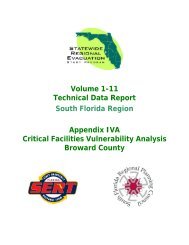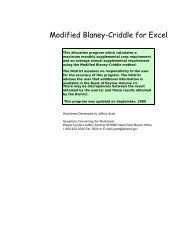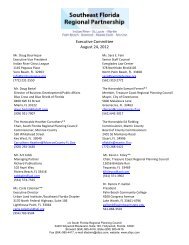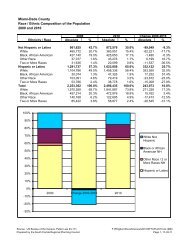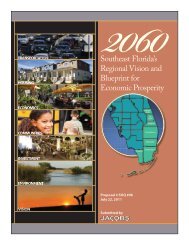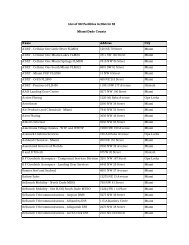Cambridge Systematics - South Florida Regional Planning Council
Cambridge Systematics - South Florida Regional Planning Council
Cambridge Systematics - South Florida Regional Planning Council
You also want an ePaper? Increase the reach of your titles
YUMPU automatically turns print PDFs into web optimized ePapers that Google loves.
<strong>South</strong>east <strong>Florida</strong>’s <strong>Regional</strong> Vision and Blueprint for Economic Prosperity<br />
<strong>South</strong>east <strong>Florida</strong> region does not yet have a shared vision to address these and other challenges<br />
and opportunities. A well-developed vision and blueprint will provide the basis for coordinated<br />
action, leveraged resources, proactive investments, and a unified voice at the state and Federal<br />
levels – positioning the region for future prosperity, livability, and sustainability.<br />
Members of the CS team has been privileged to partner with the Partnership over the past year to<br />
develop the region’s successful application to the U.S. Department of Housing and Urban<br />
Development (HUD) for funding under the Sustainable Communities <strong>Regional</strong> <strong>Planning</strong> Grant<br />
Program; and to draft the work program decision-making processes for implementing the grant.<br />
CS, Kimley-Horn & Associates (KHA), Renaissance <strong>Planning</strong> Group (RPG), Jean Scott, Mark<br />
Buchbinder, and James Carras have been part of the team of consultants and advisors helping the<br />
regional planning council (RPC) staff and other partners transition the Partnership from concept<br />
to an initial working model. The Collins Center for Public Policy, Content Creators, <strong>Florida</strong><br />
Atlantic University (FAU), and <strong>Florida</strong> International University (FIU) have been members of the<br />
Sustainable Communities Grant Consortium and active participants in Partnership meetings.<br />
This task has become even more complex than when we first started work on the grant<br />
application more than one year ago. The lagging economy and fiscal constraints may inhibit the<br />
ability of some Consortium members to meet their commitments necessary to match the federal<br />
grant, as well as to provide the staff and other resources needed to help develop and implement<br />
the RVB. Federal and state priorities have shifted significantly since the 2010 elections, with the<br />
political dialogue shifting from livability, climate change, and high-speed rail to jobs, trade, and<br />
deficit reduction. The public launch of the visioning process in late 2011 will coincide with the<br />
beginning of a political season dominated by redistricting and a national election and the RVB<br />
process will conclude in an uncertain regulatory climate marked by sweeping changes to the<br />
State’s 25-year growth management structure.<br />
These headwinds reinforce the importance of creating a strong RVB and Partnership so that the<br />
region’s leaders can work toward a shared vision which transcends short-term political and<br />
economic cycles and indeed makes the region more resilient over time. Our team is uniquely<br />
qualified to work with the Partnership to craft this shared vision and the plan to implement it –<br />
and we are ready to begin work on day one.<br />
Our Approach<br />
Figure 1.1 serves as our team’s conceptual approach and logic model, building on the<br />
Partnership’s work plan. Our approach is organized in four phases, corresponding to four<br />
questions: Where are we? Where are we going? Where do we want to go? How do we get<br />
there? We have used these questions to structure and manage visioning processes in a variety of<br />
regions. We can draw on our familiarity with visioning practices across the nation to customize<br />
an innovative approach that meets the unique needs of the <strong>South</strong>east <strong>Florida</strong> region.<br />
Our approach is comprehensive, encompassing the region’s seven livability principles and<br />
extending beyond the traditional scenario planning approach with its emphasis on transportation<br />
and land use. In particular, we will emphasize three aspects of the region’s future:<br />
Page | 2


